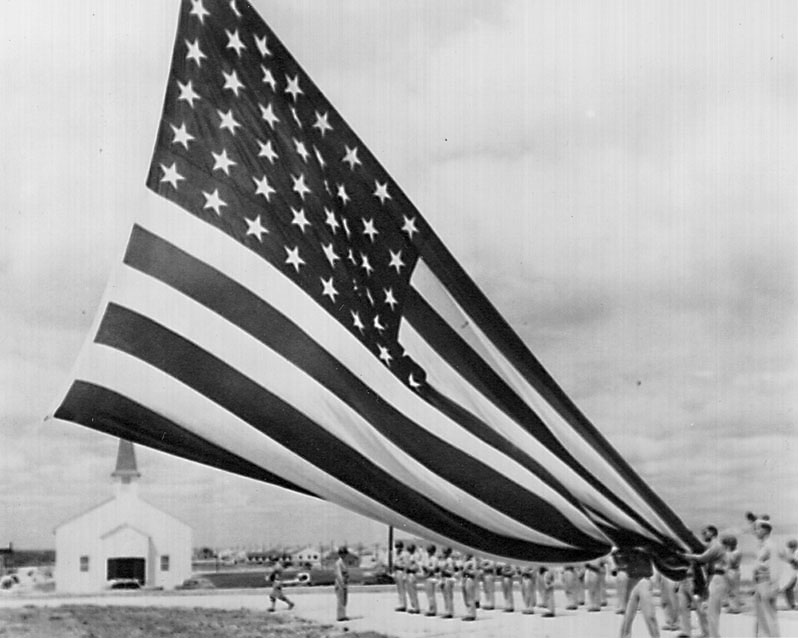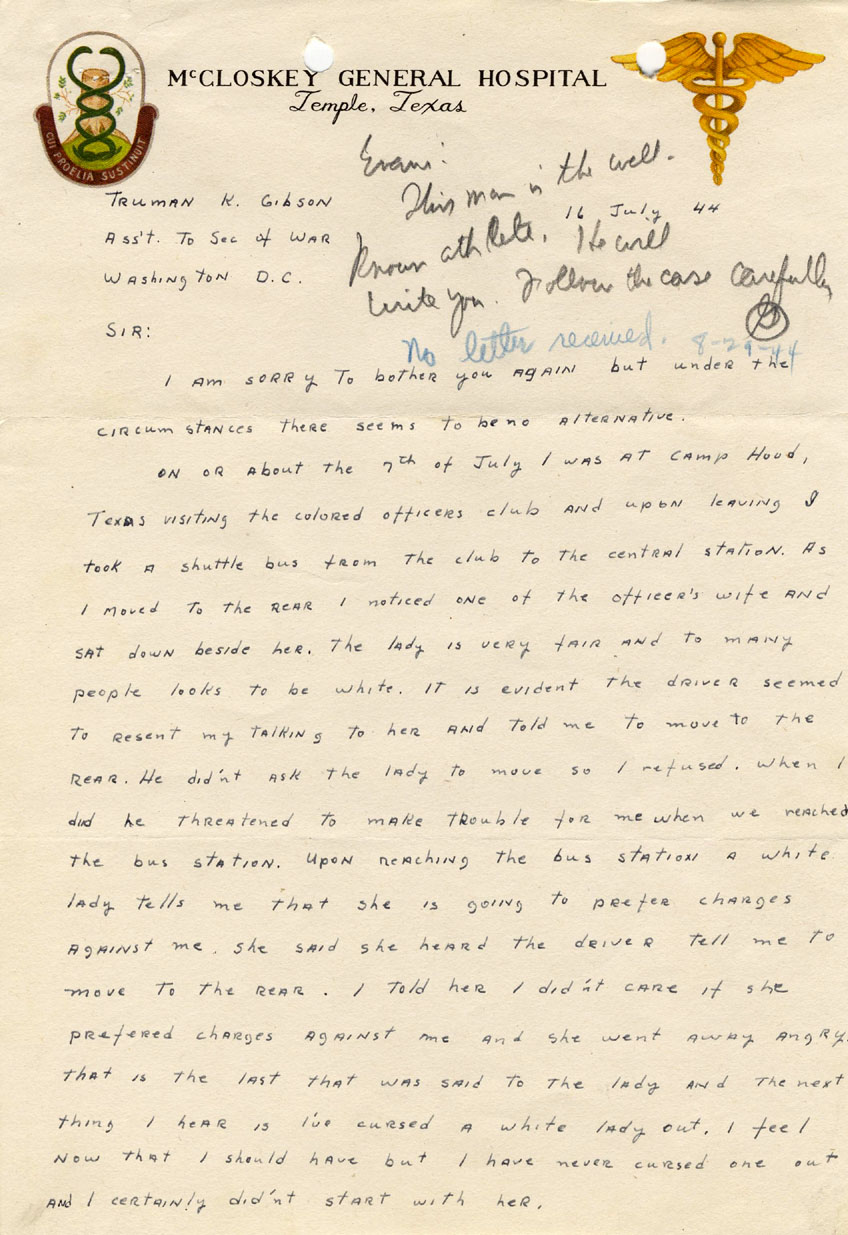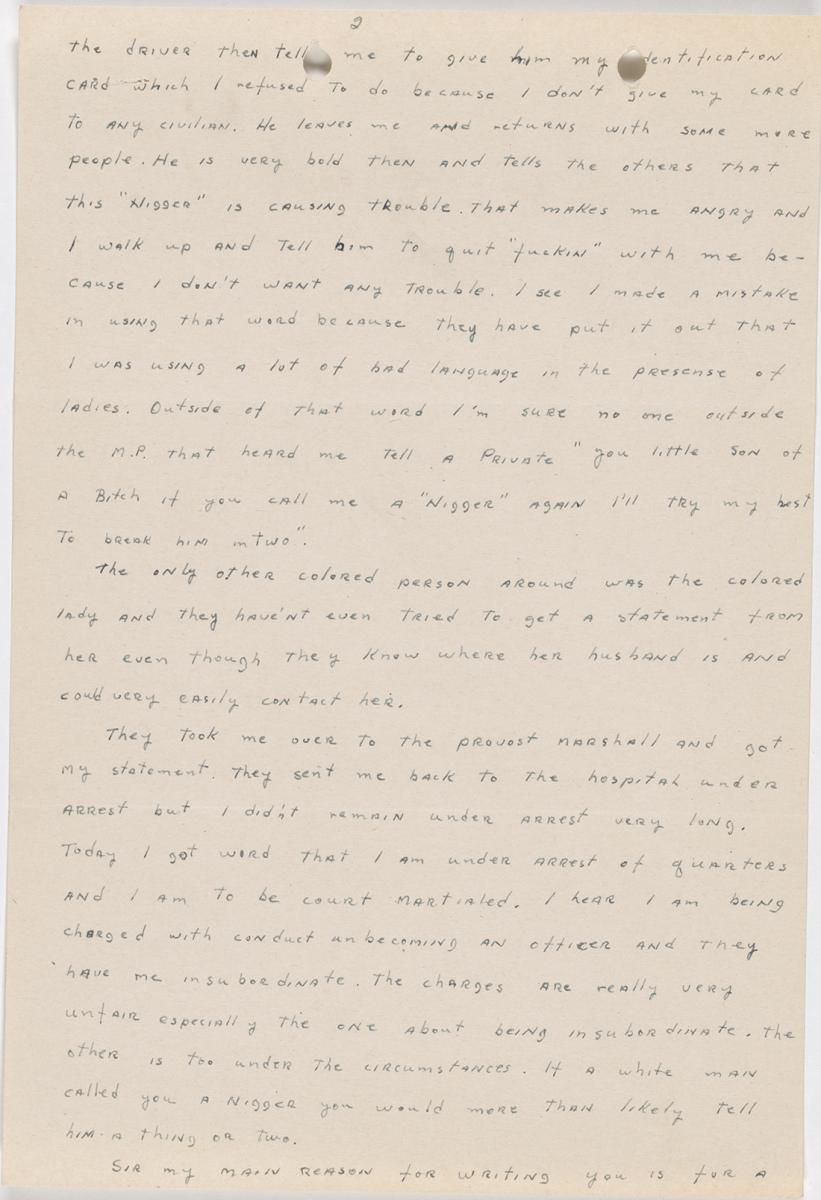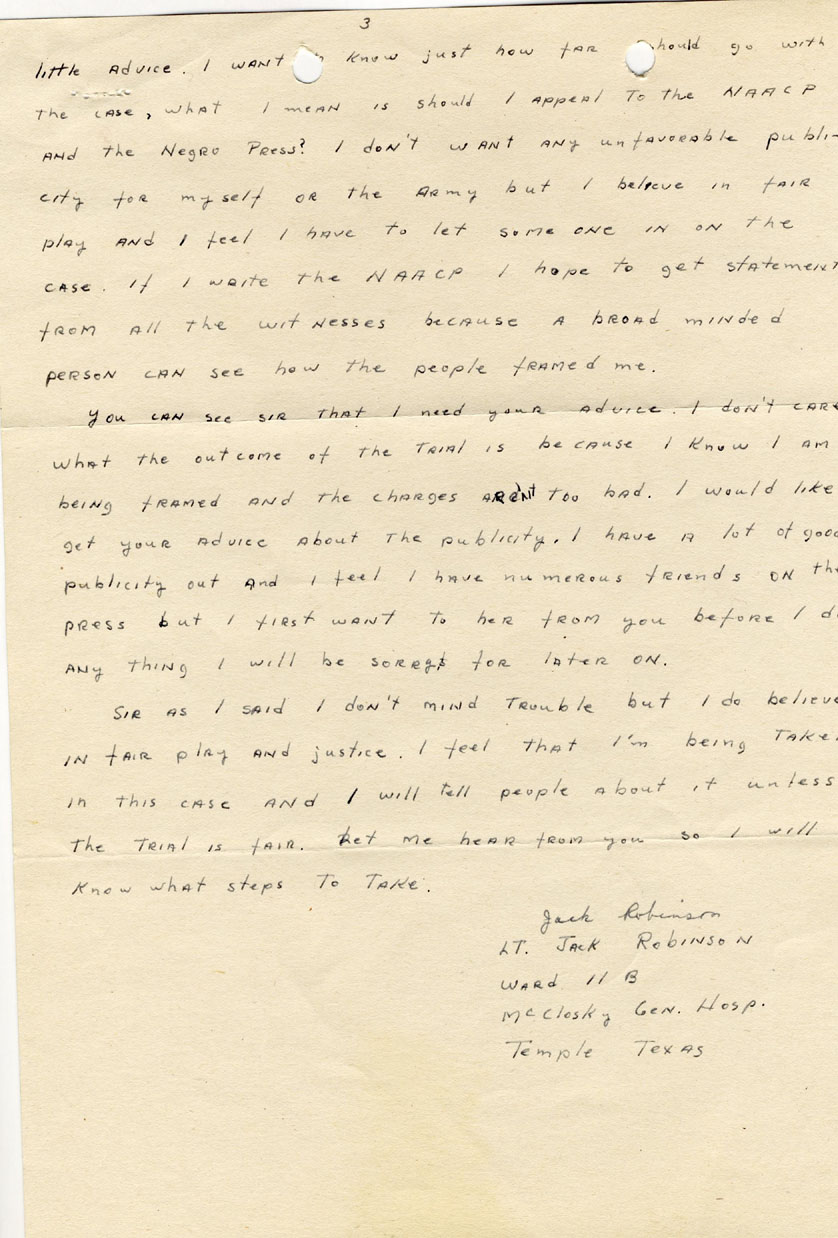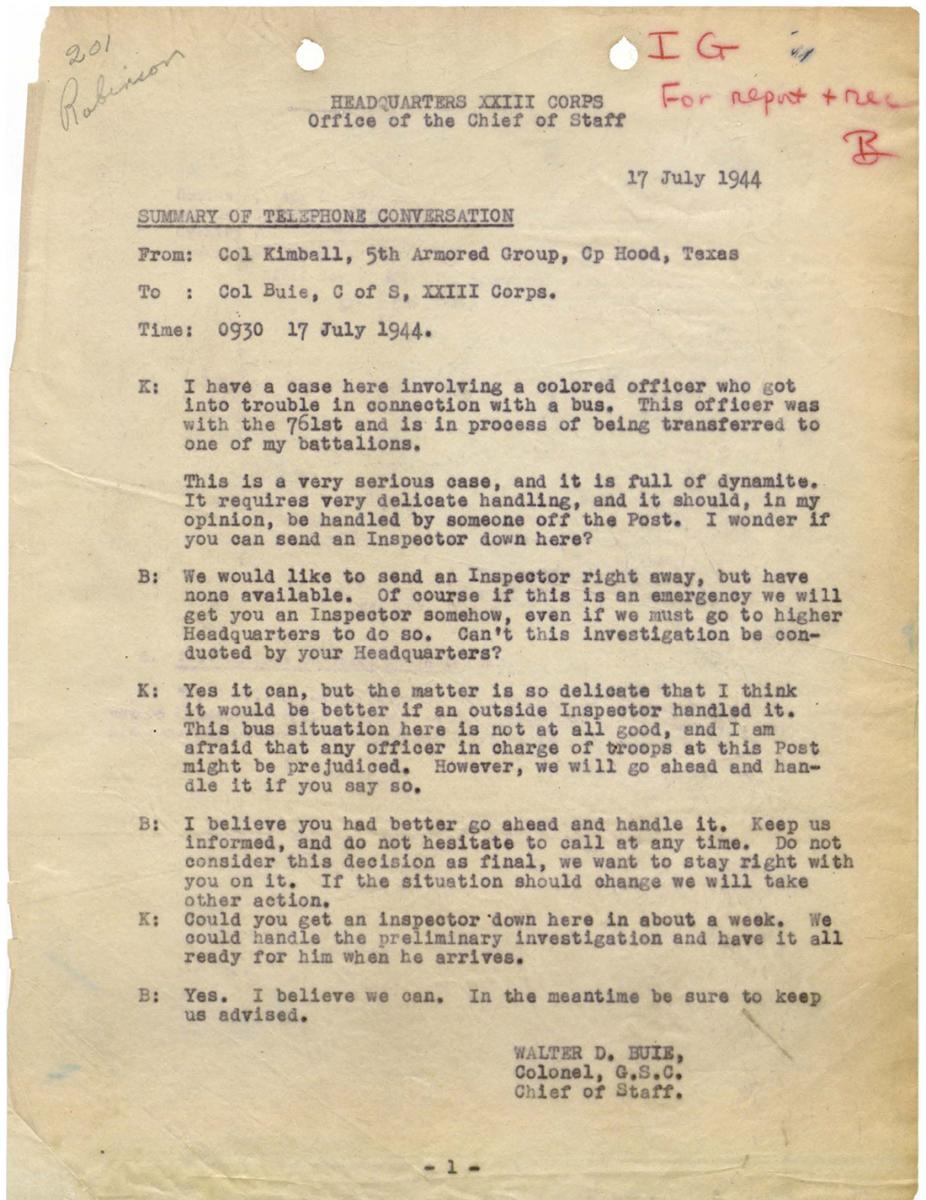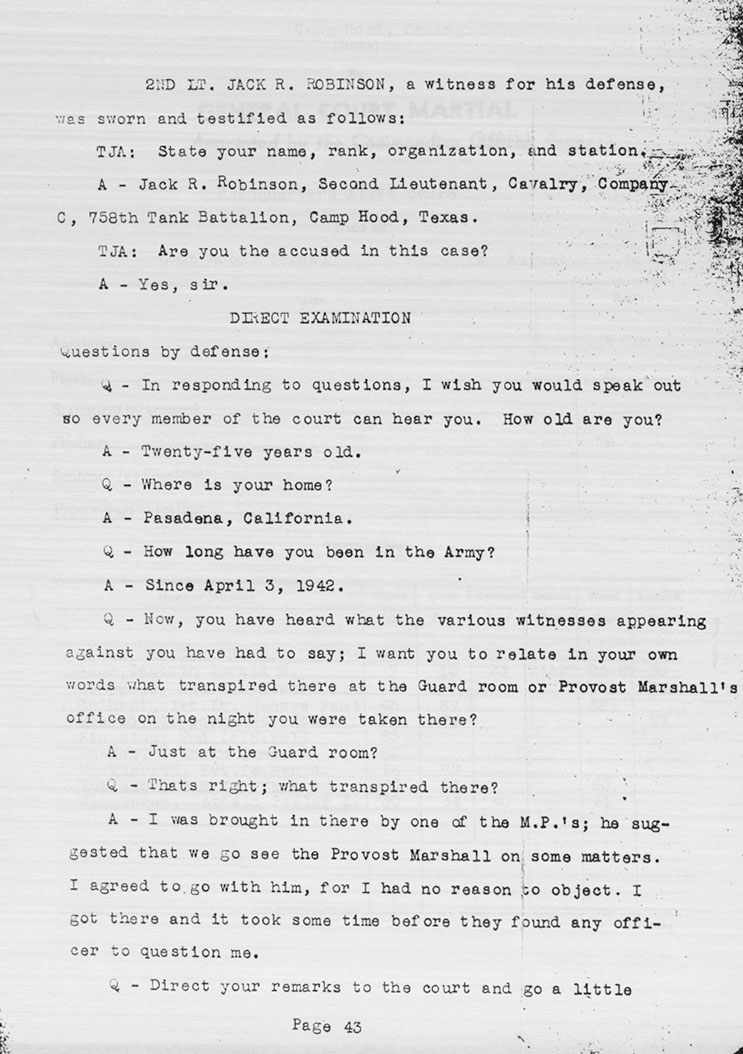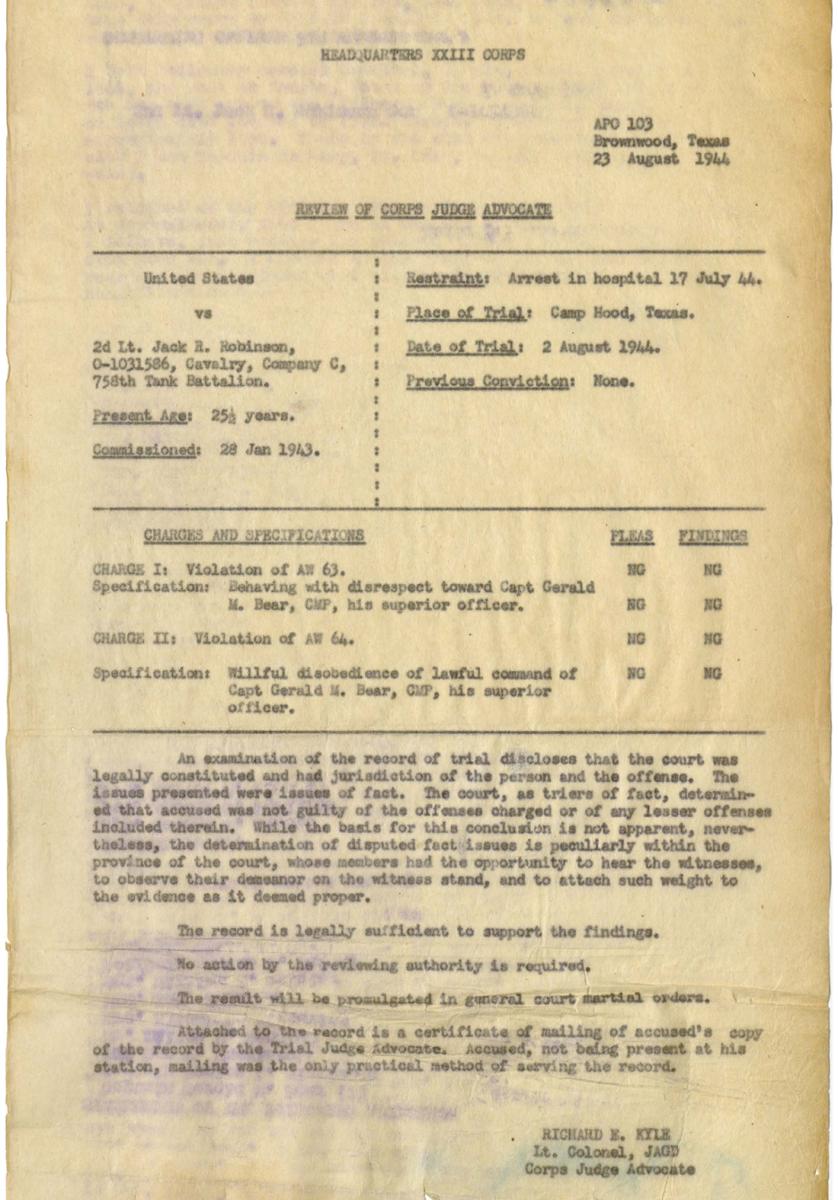
Jim Crow, Meet Lieutenant Robinson
A 1944 Court-Martial
Spring 2008, Vol. 40, No. 1
By John Vernon
If the United States does not win this war, the lot of the Negro is going to be far, far worse than it is today. Yet there is . . . an alarmingly large percentage of Negroes in and out of the Army who do not seem to be vitally concerned about winning the war.
—Assistant Secretary of War John J. McCloy, Washington, DC, 1942
We are treated like wild animals . . . like we are inhuman. . . . The word Negro is never used here, all they call us are n—r do this, n—r that. Even the officers here are calling us n—r.
—Anonymous black soldiers, Jackson (Mississippi) Air Base, 1942
As Allied troops continued their drive into the heart of Europe a month after the D-day landing in 1944, an incident that would provide a preview of post–World War II events in America was unfolding in Texas.
A young African American Army officer attached to an all-black unit at Camp Hood was subjected to a general court-martial—for resisting usual southern protocol and refusing to move to the back of the bus on the military post when directed by the driver to do so.
The trial of the young officer at Camp (now Fort) Hood received little notice at the time, but his action—refusing to go to the "back of the bus"—would become a symbolic act of the civil rights movement in the decades following the war.
And the young lieutenant would gain some valuable training for a later role as a pioneer in securing equal rights for black Americans in sports—already showing the same qualities that would make him great on the playing field and elsewhere: physical and emotional valor; strength of character; and fierce, unyielding determination to confront and conquer racism.
Second Lieutenant Jack Roosevelt Robinson was beginning to make history, well before 1947, when he became the first person of his race to play in baseball's major leagues. The sports part of Robinson's story has been exceedingly well documented, so it is understandable that the periods immediately preceding and following that phase of life have atttracted relatively little public attention.
More than 60 years later, there is still not complete consensus on exactly what happened in 1944 and why. But Robinson's gutsy action foreshadowed subsequent baseball diamond conduct and served notice on the military, which would begin desegregating in 1948, and the world that here was a black man unwilling to take even a modicum of racial guff.
On April 3, 1942, at a Los Angeles induction center, Robinson reported for military duty as required. He joined millions of other draftees—800,000 or more of them black—called by their Uncle Sam to serve. With suspect physical condition—damaged ankle—and his mother largely dependent on welfare, Robinson should not have had to serve in the armed services.
His ankle, first broken while playing football in 1937 for Pasadena Junior College and later in 1941 while performing for the semipro Los Angeles Bulldogs, contained a large bone chip, which occasionally caused the joint to lock up entirely. When aggravated by sustained and especially vigorous physical activity, this condition required intermittent visits to military doctors and hospitals during his more than two-and-a-half-year stint in the service.
By the time Robinson was called into service, the nation found itself in global warfare, embroiled on two distant fronts. The war was promising to be a prolonged and total conflict, one demanding use of all resources, human and other.
As the Second World War deepened, it became increasingly clear to the War Department that maintaining Jim Crow was expensive both in terms of morale and efficiency of effort. At the same time, it did not want to bring down a political firestorm by appearing to challenge or erode the racial status quo. Consequently, "colored" soldiers were routinely confronted with inferior training, few recreational facilities, limited access to public transportation, constant racial name-calling, and even serious physical mistreatment.
But inequities in racial status constituted not just a minor or regional vexation. Rather, as badly as it affected overall troop morale here and abroad, the "separate but equal" doctrine amounted to a systemic poison that distracted from and threatened to undermine the overall American military effort. Numerous times during war, high-level War Department figures stated that segregation was only a convention it had inherited from the larger American society and was not something it was equipped to change while fighting a war. Although that answer was correct in its own way, it was also disingenuous. The pronounced presence of racially patronizing attitudes in this country certainly was not confined to the civilian population. Old-line officers not only often took part in and approved of segregation as a policy toward black cadets at West Point but also advocated its strict practice among the rank and file.
Compounding the problem was the government's decision in 1940 to conduct a universal draft. This was to be the first time that African Americans were inducted on a wholesale basis. Many training camps were located in the south, where much of the African American population still remained despite massive migrations from there begun during World War I. From 1941 on, one out of every three black inductees came from north of the Mason-Dixon Line, a considerable increase. Significantly, as a War Department report acknowledged, these new recruits' demeanor demonstrably lacked "the appearance of servility traditionally associated with the Southern Negro."
Within the military, the prevailing view was that black soldiers were chronically undisciplined, morally slack, mentally deficient, and possibly cowardly in battle. Black officers, very much underrepresented considering the numbers of draftees, were little respected by whites of whatever rank. In 1940 there existed only five black officers (three of them chaplains) in the entire U.S. Army, and of all the men serving in the armed forces, less than 1 percent was black. By 1943, that percentage had risen to just 1.1 percent. Consequently, African American officers were allowed extremely limited opportunities for leadership and advancement in the Army. Chances to serve in a meaningful way beyond simple service or support capacity were even less available in the Navy and the Marine Corps.
After quitting UCLA in the latter part of his senior year (1940) to financially assist his mother and nearly destitute family, Robinson took a variety of sports-related jobs before being drafted and then assigned to Fort Riley, Kansas. There, after making corporal and distinguishing himself on the firing range, he became a commissioned officer after meeting and becoming friendly with heavyweight champion Joe Louis. Robinson and other black aspirants had informed Louis that no African Americans were ever admitted to officer candidates' school at Fort Riley. Using his influence with the secretary of war's civilian aide, Truman Gibson, himself black, Louis quietly had the situation investigated. In January 1943 Robinson and several other African Americans were commissioned second lieutenants.
Considering his past, it was not surprising that Lieutenant Robinson, as a platoon leader and his unit's morale officer, soon made it a point to strenuously object to many of the segregated practices at the fort. In one instance he engaged in an animated telephone shouting match with a white major over whether black soldiers deserved fuller access to the installation's post exchange (PX). Further, he refused to play football for the post when not allowed to play also on its all-white baseball team. When his commanding officer reminded the lieutenant that he could be ordered to play, Robinson agreed that was so but remarked that he could not be ordered to play well.
In early 1944 the 25-year-old cavalry-trained officer found that he had been reassigned to Camp Hood, located about 40 miles southwest of Waco, Texas. Lieutenant Robinson soon became informally attached to a black tank unit, the 761st Tank Battalion, which later distinguished itself in the European theater's Battle of the Bulge. Camp Hood was a posting many African Americans hated, given the racial climate there. Camp Hood had already earned a dismal reputation among black officers and enlisted men, not only because of complete segregation on the post but also because neighboring towns such as Killeen and Temple were so inhospitable. These mostly farming communities were replete with hard-core racists eager to administer lessons to unwary black soldiers who might think present military status transcended time-honored racial etiquette.
A plague for black soldiers stationed at many of the southern training camps—especially when civilian bus lines held the contract for transporting soldiers both on and off the posts—was obtaining that transportation. More than a year before Robinson's bus encounter took place, a friend of the civilian aide Gibson commented on Camp Hood's extreme case. In his letter, he described the camp as "one of the worst situations in the whole AUS [Army of the United States]" and went on to remark, "There is hostility between [military police and black personnel] and segregation on interstate buses operating on the post, and segregation in the post facilities and theaters."
On July 6, 1944, exactly one month after D-day—assault landings in which black soldiers had participated—Lieutenant Robinson was forcibly reminded of how thoroughly Jim Crow still dominated the scene. As he was returning that evening to the hospital, Southwestern Bus Company driver Milton Reneger brusquely instructed the lieutenant to move to a seat farther back from the one where he sat next to a fellow officer's light-skinned wife. Robinson, perhaps conscious of being an officer and a husky one at that, refused, suggesting that the driver tend to driving instead.
Robinson's sharpness of response may have been at least partially attributable to recollection of previous bus incidents at Hood and other installations regarding what blacks saw as a pattern of unfairness. As one of the 761st's officers remembered, "There were so many problems with the bus situation that battalion commanders and the company commanders almost let us have trucks at will to go to the town . . . rather than mess with what went on with the bus."
Later, at his stop, Robinson and the driver continued to argue, joined by the latter's bus dispatcher, Beverly Younger, who casually referred to Robinson in his presence as "a n—r." When military policemen arrived at the scene, a crowd of indignant whites, both civilian and military, had formed, adding to turmoil and confusion. The MPs on site, none of whom outranked the lieutenant, asked him to go with them to the police headquarters to straighten out the situation. He agreed to do so. However, when they arrived at the station to meet with the camp's assistant provost marshal, a white MP ran up to the vehicle and excitedly inquired if they had "the n—r lieutenant" with them. The utterance of this unexpected and especially offensive racial epithet served to set Robinson off and he threatened "to break in two" anyone, whatever their rank or status, who employed that word.
Inside the building, further exposure to what he regarded as racially unfriendly remarks and unwarranted observations by strangers convinced the young officer that he was not going to be treated fairly. Observing the clumsy wielding of authority by the assistant provost marshal and the officer of the day in questioning supposed witnesses, Robinson allegedly conducted himself in a "sloppy and contemptuous" manner toward them. After he vehemently contradicted other persons' versions of the bus incident and failed to remain in the facility until called to give his own account, he was taken back to the hospital under guard and under protest.
He subsequently learned that his behavior had been construed as so spectacularly incorrect that he would now be subjected to a general court-martial. The justification given was that he had committed a number of monstrously serious transgressions—including the show of disrespect toward a superior officer and failure to obey a direct command. Thirteen depositions had been taken, attesting to Robinson's gross misbehavior.
Believing these charges to be contrived and racially motivated, Robinson determined to broadcast his account of what really happened. He and others contacted the National Association for the Advancement of Colored People (NAACP) and sought publicity from the Negro press. A letter to the secretary of the NAACP by a correspondent who identified himself only as Robinson's fellow officer alleged that "the whole business was cooked up as insubordination." According to "Anonymous," "Robinson's predicament amounted to a typical effort to intimidate Negro officers and enlisted men" at Hood and the surrounding area, and all that was needed was an independently conducted investigation and attendant publicity to spotlight "just how rotten the whole business is."
From McCloskey General Hospital, where he was confined to quarters, Robinson also wrote to the War Department's civilian aide Gibson. In a three-page handwritten letter expressing concern but not panic, the lieutenant asked Gibson if the newspapers should be notified of the trumped-up charges. He wondered if the trial would then receive spotlighted attention from the larger world beyond Camp Hood—a world aware that Texas, one of four states accountable for more than half of all blacks lynched through the years, possessed a chronically inflamed racial climate such that so-called "justice" was often obtained frontier-style. Robinson admitted using strong language—but only in selected company and after being provoked. The defendant closed, "I don't mind trouble but I do believe in fair play and justice."
Gibson annotated Robinson's letter, stating, "This man is the well-known athlete. He will write you. Follow the case carefully." He then answered Robinson, advising that no action on his behalf could be taken by his office before the trial, but he wanted to be apprised of the outcome. Gibson, a onetime NAACP official, also counseled against seeking publicity in the matter because he thought doing so would only fan the flames.
Soon afterward, headquarters at Hood started to field queries about the impending trial from other military personnel, the Pittsburgh Courier, Robinson's state senators, and miscellaneous others. Even the Adjutant General's Office (AGO) in Washington, when asked from the outside about Robinson's plight, referred to him as the "Negro football star alumnus of UCLA of excellent family and reputation." Independently, the Army was beginning to realize that it was sinking in quicksand over such matters, and this was just the latest and most nakedly visible development.
Despite increased efforts to curb at least the most overt discriminatory practices on military property, embarrassing incidents were occurring all too frequently. Only a couple of months before, Joe Louis and 23-year-old "Sugar Ray" Robinson, the latter also a boxer in the Army, had their own bus-related set-to. It happened at Camp Sibert, Alabama. The two boxers often journeyed from camp to camp to stage exhibitions for Uncle Sam, but this time an officious MP informed Louis he could not use the telephone in the bus station when the bus he and Robinson were awaiting did not show up. With that, the usually mild-mannered heavyweight champion voiced stiff objections directly to the base commander.
When the black newspapers got word, they expressed outrage in large print: Was this the way to treat a man who not only voluntarily enlisted but gave unstintingly to the military, even donating a generous portion of boxing winnings to the Army-Navy Relief Fund? To a thoroughly indignant press, it was evident that not all enemies and bigots lived abroad. Further, such warped behavior called into question why black Americans should risk lives overseas when unfairness flourished at home to such a perverse degree. The Negro press hammered at this message over and over again in its "Double V" effort (war against bigotry and racial intolerance both at home and abroad). The military and the Department of Justice considered the criticisms unseemly, corrosive, and bordering on disloyal. Gibson and others, including the Army's only black general, Benjamin O. Davis, Sr., were emboldened by the adverse publicity and stepped up efforts to radically clarify and extend existing equal access policies.
Army brass on any level could not have been thrilled to learn that news about the impending Jackie Robinson court-martial had reached the black papers. Two of the most zealous publications, the Courier and the Chicago Defender, found out about the bus incident and referred to it in print. Ironically, an Army-wide directive, War Department Order #97, dated two days after the Robinson bus flap, emerged as the most widely explicit in clarifying that no discrimination on the basis of race was allowed in regard to use of recreational facilities, theaters, transportation, and the like. Even so, as if to punctuate the Army's lack of grasp about how wide and deep the issue really was, both before and after this issuance, local commanders chose to interpret the pronouncements as they wished.
In addition, unbeknown to the defendant and Washington-based authorities, Camp Hood's Inspector General's Office, the appropriate organizational level for investigating whether court-martial charges should be levied in each such case, was seeking assistance from higher sources. Headquarters for XXIII Corps was located in Brownwood, near Fort Worth, Texas, and its jurisdiction encompassed Texas, Arkansas, and Arizona. In a transcription of a July 17 telephone conversation between a Colonel Kimball at Hood and a Colonel Buie, XXIII Corps's chief of staff, the former referred to the Robinson predicament as "a very serious case . . . full of dynamite." Thus he thought it needed "very delicate handling"—preferably "by someone off the post." Kimball went on, "This bus situation here is not at all good, and I am afraid that any officer in charge of troops at this post might be prejudiced." Thus Kimball was asking if Camp Hood could obtain guidance from higher level command as to whether or not to prosecute. Despite the plea for help, Colonel Buie demurred.
On August 2, the court-martial began, now with significantly altered charges, and after Robinson's transfer from the 761st to another tank unit, the 758th. A panel of nine officers was appointed to adjudicate the case.
Interestingly, just before the trial took place, a medical retiring board convened on July 21 to evaluate whether Robinson's temporary limited duty status should be changed to permanent. Robinson affirmed his continued interest in staying in the military as a career. That he did so was probably due to an earlier suggestion by his commanding officer with the 761st, Lt. Col. Paul Bates. Bates wanted to see if it were possible to obtain a medical waiver for the bad ankle. Bates hoped that Robinson could go overseas with his unit as morale officer if it were called up. A waiver would mean that Robinson, who after all injured the ankle prior to entering the service, would be willing to forego injury claims on the Army if reinjured overseas.
Ironically, because of his willingness to consider doing this good deed for Bates, the 761st, and the Army, he had been repaid not only with emotional aggravation but a dire legal situation. For it been on the trip back from Camp Hood to McCloskey General Hospital in Temple, Texas, where he was undergoing a thorough medical evaluation, that the bus incident occurred.
Bates, a fellow Californian, was called upon at the trial to testify to his onetime company platoon leader's character. He consistently used the word "excellent" to describe Robinson's demeanor, reputation, and job performance and offered that he had tried repeatedly to get the defendant attached permanently to his battalion. The commander volunteered the information that he had thought so highly of his 25-year-old junior officer's leadership abilities that he asked the younger man to accompany the unit overseas when it was called to do so. The court, made up of nine combat officers, found the glowing testimony highly persuasive.
Although Robinson had been counseled by both the NAACP and Gibson to obtain a civilian lawyer, he failed to do so—probably because he believed he lacked the resources to afford the legal fees. Nevertheless, his Army-appointed defense attorney, Capt. William A. Cline, a white Texan, skillfully brought out inconsistencies in prosecution witnesses' accounts, including a denial by one prosecution witness, Pfc. Ben Muckleworth, that he had used the word "n—r" in referring to Robinson when another MP had acknowledged that Muckleworth had indeed done so.
As part of the trial strategy, prosecutors reduced the final charges so as to remove reference to the bus incident as contributory to Robinson's behavior later. However, Cline, by careful questioning, managed to introduce enough into evidence to strongly suggest Robinson had been consistently confronted with a racially hostile environment. By separating facts from interpretations, Cline introduced the very real possibility that scarcely suppressed racial animosities may have provoked Assistant Provost Marshal Gerald Bear to overreact to Robinson's assertiveness, construing it as "uppity" rather than legitimate expression of righteous resentment.
Further, Cline was able to shed doubt on whether Captain Bear sufficiently articulated recognizable and specific orders for Lieutenant Robinson to obey and in fact whether the entire incident had been mishandled militarily by Bear. Time and again court members pressed Bear as to what he actually said versus what he intended to say. It emerged that Bear could not say for sure whether Robinson had ever received "orders" at all and that the thoroughly agitated young officer had a right to be confused. Ultimately, after all testimony was heard, the court acquitted the defendant of all charges.
Was the "not guilty" outcome more attributable to defense counsel's legal capabilities, the poised lieutenant's calm and capable testimony, the trial's conspicuousness, or to the ultimate soundness of the military justice system? The answer is not altogether clear.
It is worth noting, however, that the black newspapers—because they were published on only a weekly rather than a daily basis—were unable to publicize Robinson's trial before the military court had heard Robinson's case and made a ruling. Thus, however keen their interest, their coverage lagged behind actual events. In fact, a full 10 days after the trial, in the same issue of the Chicago Defender that trumpeted the Army's departure from previous racial policy in declaring PXs, theaters, all post facilities, and buses to be freely available, the "National Grapevine" columnist, "Charlie Cherokee" referred to the trial as if it were upcoming. Therefore, the publications' opinions, as pronounced as they were, could have had no influence on the resulting legal outcome.
Additionally, although numerous later publications have said outright or insinuated that Robinson was transferred from the 761st to the 758th after the bus incident only to ensure that he would be prosecuted, that is incorrect. He had himself known the week before the disturbance that he had been transferred and that the paperwork was in the works. Even whether his final release from active duty was to constitute an "honorable discharge" or amounted to something less has been at issue, although unnecessarily so. Advancing years, faulty memory, enduring myth, wishful thinking, and revisionist history have conspired to muddy reality, but the documentary record comes the closest to approximating what actually happened so long ago.
What was to be made abundantly plain shortly after the trial was that Lieutenant Robinson had quite enough of the U.S. Army, and it had had enough of him. Eventually his previous unit's orders to ship out did arrive, but the 761st prepared to journey overseas without Robinson. Despite his later claim that its men had shipped out already, in fact they had only departed Camp Hood. In preparation for eventual mobilization abroad, the tankers had been moved to a staging area at Camp Shanks, New Jersey, near the New York City harbor. Given that they were stationed at Shanks for nearly a month waiting for final departure clearance, had Robinson felt a burning obligation to join them, he could have done so.
Understandably, though, Robinson now wanted out of the service and seized upon his bona fide "limited duty" fitness classification as the means. A day after acquittal, the AGO concurred in the findings of the Retirement Board that he would be retained in the military on a limited duty status. Beyond going through regular hierarchical channels, he wrote several times to the Adjutant General's Office, arguing that as damaged goods he might as well work in the civilian sector.
The Army appeared as anxious to accommodate his request as he was to make it —possibly regarding him as, if not an outright troublemaker, a chronic lightning rod for controversy—granting his release within two months. His discharge took effect in November, just as the 761st encountered severe battle conditions in Europe and eventually suffered heavy casualties. Accordingly, it is not outside the realm of possibility that had Robinson gone on to Europe, he might have been unable to play baseball later if maimed or killed, as so many gallant men from his unit were.
Several conclusions about the military's numerous racial contretemps are in order. What happened to Robinson was not an isolated experience, and it offers a stiff reminder that African Americans had been challenging discriminatory treatment almost from its inception. This court-martial affair featuring Jackie Robinson therefore does not constitute a lone profile limited to a narrow window in time; it is a rare story of black resistance to mainstream bias, white presumptions of superiority, and accompanying sense of perpetual racial entitlement.
Robinson's own plight and that of many other black soldiers who also ran afoul of Jim Crow in military and civilian life hint at how much human potential had been wasted through the years as the nation struggled to reconcile its ideals with its actual practices. The court-martial stands as a microcosm of the overall black military experience during World War II. Distilled down to one encounter between Jim Crow and a lone black man, it was Jim Crow who knuckled under. In this instance at least, genuine justice won out, as the Army ultimately made the right call by acquitting him.
The court-martial documents reveal a proud and mentally acute young man, one already resolved to confront Jim Crow wherever, whenever, and whatever the consequences. His comportment revealed courage amounting almost to audacity, because even under the bleakest of circumstances, he was sustained by an unusual, almost congenital, determination to fight racism. In the face of determined, implacable foes such as Robinson and other black veterans, the enemy—ethnic bigotry—was going to have to give ground.
How he handled the military encounter was actually truer to the way the future Dodger approached life's challenges than was understood to be the case during his first years within organized baseball. By that time he had learned calculated prudence, and so he decided to turn the other cheek. But although he learned the pragmatic necessity of occasionally being willing to cede territory temporarily, he certainly did not plan to do so forever, as his subsequent career would attest.
The mature Robinson no doubt came to regard that Camp Hood tour of duty as something more than a limited skirmish. For a seasoned and enthusiastic fighter against personal injustice and racial favoritism, surely he considered that bleak experience as a general call to duty in behalf of others less well equipped for extended battlefront duty. Hence, his epitaph might read "Soldier Once and Always."
John Vernon has served the National Archives and Records Administration as archivist, historian, and teacher. Before coming to the Archives he served as a history professor at Tuskegee Institute, where he gradually became interested in doing research in archival records. His most recent research interests and publications have concentrated on Jackie Robinson's civil rights activities and advocacies, sports documentation issues, and the Negro Leagues.
Note on Sources
Principal archival sources include National Archives Record Groups 107, 153, and 407. Within the Records of the Adjutant General's Office, 1917– (RG 407), filed under War Department decimal number 291.2 ("race"), is a rich concentration of records shedding light on divergent American attitudes toward a racially segregated military. Records of the Civilian Aide to the Secretary of War, found in the Records of the Office of the Secretary of War (RG 107), further complement those described earlier in aiming primarily on the military racial landscape. Jackie Robinson's court-martial case file, located within the Records of the Office of the Judge Advocate General (Army) (RG 153), contains the full account of his trial. Particularly interesting are the prosecution and defense witness depositions and the trial transcripts. Additional documents contained in his overall personnel file (OPF) provide background details not found elsewhere, for example, Robinson's medical records and the transcription of the July 17, 1944, telephone conversation between Colonels Buie and Kimball.
Three books: Brothers In Arms: the Epic Story of the 761st Tank Battalion, WWII's Forgotten Heroes, by Kareem Abdul-Jabbar ( New York: Broadway Books, 2004); Liberators: Fighting on Two Fronts in World War II, by Lou Potter with William Miles and Nina Rosenblum (New York: Harcourt Brace Jovanovich, 1992); and Hit Hard: The 761st Tank Battalion: A Black American Armored Unit Battles into Hitler's Germany, by David J. Williams (Bantam War Book, 1990) contain the most complete widely published accounts of the 761st's exploits. Another volume, done by a battlefront correspondent soon after the war, provides much of the day-to-day historical unit action and background detail. It is titled Come Out Fighting: The Epic Tale of the 761st Tank Batallion, by Trezzvant W. Anderson (Teisendorf: Salzburger Druckerei und Verlag, 1945).
Two recent Robinson biographies, Arnold Rampersad's Jackie Robinson: A Biography (New York: Knopf, 1997), and David Falkner's Great Time Coming: The Life of Jackie Robinson from Baseball to Birmingham (New York: Simon & Schuster, 1995), chronicle Robinson's full military career, including the court-martial proceedings, and fill in other details of his life. The best article on the trial itself, "The Court-martial of Jackie Robinson," American Heritage Magazine (March 1984) is by Jules Tygiel, author of the critically acclaimed The Great Experiment: Jackie Robinson and His Legacy (New York and Cambridge: Oxford University Press, 1987).
A compelling insider's take on the issues and stakes involved is provided by Truman K. Gibson (the one-time War Department civilian aide) and Steve Huntley in Knocking Down Barriers: My Fight for Black America (Evanston, IL: Northwestern Press, 2005). Finally, a poignant and powerful popular volume with commentary about the whole deplorable racial climate in the wartime military has been edited by Phillip McGuire, Taps for a Jim Crow Army: Letters from Black Soldiers in World War II (Lexington: University of Kentucky Press, 1993) and makes for chilling reading.
Updated Aug. 26, 2008
